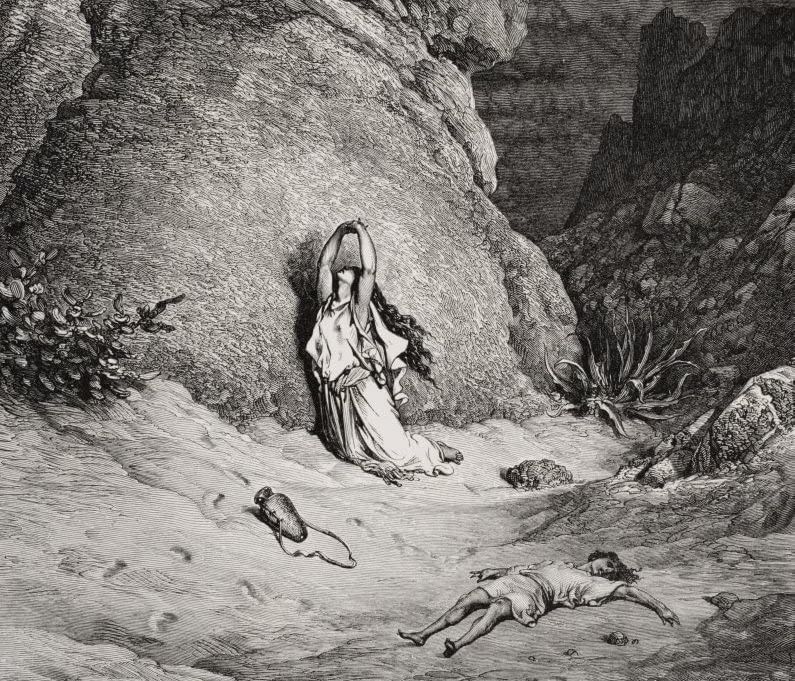For Part 1 see here
The second time we meet Hagar, Sarah is no longer barren. She has borne Isaac. However, Sarah is again in a jealous mood.
Her jealousy and ego are so severe that she is not even able to call Hagar and Ishmael by their names. Even though she was the one who initiated Ishmael’s birth, she calls them ”this bondwoman and her son,” in order to remind Abraham of their status.
When we are in such a mood, it points to untamed fears in us. Sarah is afraid that Isaac will have to share an inheritance with his half-brother Ishmael. Abraham does not like what is happening, but with God’s “help” Sarah succeeds in convincing Abraham to expel Hagar and Ishmael – banishing them into mortal danger.
In an in-depth reading, one can see within this story the “binding of Ishmael,” but I shall leave that for another article.
Genesis 21:9-13 (NKJV)
And Sarah saw the son of Hagar the Egyptian, whom she had borne to Abraham, scoffing. Therefore she said to Abraham, “Cast out this bondwoman and her son; for the son of this bondwoman shall not be heir with my son, namely with Isaac.” And the matter was very displeasing in Abraham’s sight because of his son.
But God said to Abraham, “Do not let it be displeasing in your sight because of the lad or because of your bondwoman. Whatever Sarah has said to you, listen to her voice; for in Isaac your seed shall be called. Yet I will also make a nation of the son of the bondwoman, because he is your seed.”
The story is difficult, almost ending in tragedy. However, if we delve deeper, we will see repentance and restoration in action. The story shows the stages of Hagar’s awakening, understanding and change; from which we can learn how, in our own lives, to make a fundamental change when we are at a low ebb. We can learn how to deal with an almost impossible difficulty.
Hagar’s story shows the confrontation and overcoming of one of the greatest fears that exists in all of us: Fear of death! She can teach us the steps a person must go through to experience correction and return to himself, to faith and to God. The Bible is alive, relevant at all times. In the wonderful pages of the Bible you can find a guide to life.
In the first stage of the story Hagar loses her way. She wanders, lost in the desert, while carrying her child on her shoulder. Let’s try to put ourselves in this situation for a moment, in Hagar’s shoes. Try to feel the weight of the child Ishmael on your shoulder, a heavy burden. She has only a water “bottle” – maybe a liter (~quart) of water in the hot, dry Negev Desert.
Her water is running out. Her life is running out.
Another few drops and it’s all over. Thoughts of death arise in her mind. In these moments of losing our path, we all feel how the weight of life, can suddenly land on our shoulders. In such moments of serious challenge we all feel the harshness of the journey, the dryness, the heat, the heaviness and the hopelessness. We feel emptied of life, like death is looming.
In this moment of such a severe crisis and lack of faith Hagar casts her child under the bushes. She despairs, loses all hope that she will be able to save him or even survive herself. She walks away and sits on the ground “at a distance of about a bowshot” so as not to see her child die.

“Let me not see the death of the boy.” (verse 16)
Is not this a prayer that every parent carries in her or his heart?
Can anyone stand to see their child on the verge of death?
The weight of her body crashes to the ground, like the child who fell from her hands.
These are moments of surrender. She can’t take it anymore. Often the first stage of challenge is also the most difficult – bringing despair and heartbreak. If she had succumbed to the situation then we would read a different text, probably about her death and the death of Ishmael. But this is not the end of the story. The story here is about what we do in a crisis, in the moment when we see no hope.
We witness that Hagar out of heavy despair gets up, shouts and cries out,
”So she sat opposite him, and lifted her voice and wept.” (verse 16)
And this is the second stage in our turnaround, in repentance (tshuva). This is the awakening that makes her cry, and call out for help.
It is a stage in life where we connect to the most difficult emotions, emotions that we are usually unwilling to voice, unwilling to admit, even to ourselves. But as soon as we express the loud cry from within; we understand we don’t need to be alone.
Help is coming!
Then comes the third stage the listening phase.
And God heard the voice of the lad. Then the angel of God called to Hagar out of heaven, and said to her, “What ails you, Hagar? Fear not, for God has heard the voice of the lad where he is.” (verse 17)
As soon as Hagar calls for help, help is on the way. She suddenly hears a voice, the voice of God speaking to her, instilling in her new strength and hope, planting in her everything she did not have just a moment before. In that moment she became willing to accept help. She became willing to listen to another voice, not just the voice of death in her head. These are moments of surrender. Hagar becomes willing to listen, trust and have faith. Now new things can happen.
A moment before, she felt that she and Ishmael were about to die, but now hope is born.
When we start really listening and are willing to accept help, faith is kindled in us. Suddenly the death that seemed so near and the despair that knocked us down, no longer feel as threatening. And we are ready to stand up, mobilize forces and pull ourselves back into the story.















